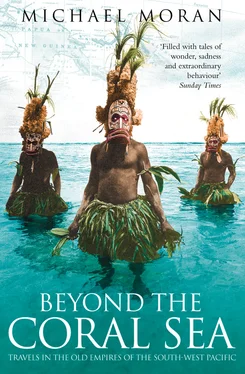1 ...7 8 9 11 12 13 ...24 The islands also attracted visitors of genius who had serious academic intentions. Perhaps the most famous of these was the Polish anthropologist Bronisław Malinowski who, at the outbreak of the Great War, pioneered new methods of fieldwork in the Trobriand Islands. Melanesia subsequently became a cultural laboratory for European anthropologists and one of the most closely studied of the ‘unknown regions’ on earth.
In 1906 Australia took responsibility for British New Guinea and the British Protectorate ceased to exist. The new territory was now to be called Papua. The first Lieutenant-Governor of Papua, Sir Hubert Murray, was an empire builder of Olympian accomplishments. He was a character who seemed to have stepped straight out of Boy’s Own fiction. Born in Sydney in 1861, he stood six foot three, weighed fourteen stone and was amateur heavyweight boxing champion of Great Britain. A rowing blue at Magdalen College, Oxford, and possibly the finest swordsman in Australia, he had read Classics and achieved a double first.
A career as an Australian barrister beckoned but he abandoned the idea as ‘too tedious’. In 1904 the post of Chief Judiciary Officer became available in New Guinea. In need of diversion, he replied to a newspaper advertisement and was offered the post. He adopted a paternalistic style of governorship, promising the Papuans, ‘I will not leave you. I will die in Papua.’ At the time he was considered progressive but now is considered by indigenous historians as being regrettably colonial. He greatly admired men who exercised self-discipline and refused to open fire on the most threatening of warriors. While travelling the country on his circuit he carried a portable library. His nephew recalls seeing him reading a Greek text in rough weather, seated in a chair lashed to the deck of his small government vessel Laurabada , holding it above the waist-high foam to keep it dry.
He wrote a number of excellent books recalling his tours of duty, full of wry observation. He mounted expeditions into the interior and developed a degree of understanding of native customs and languages unusual in colonial administrators of the time. His laconic style keeps one turning the pages. He describes murder in his book Papua or British New Guinea published in 1912:
… murder to these outside tribes is not a crime at all; it is sometimes a duty, sometimes a necessary part of social etiquette, sometimes a relaxation, and always a passion. There is always a pig mixed up in it somewhere … Cherchez le porc.
He later refers to the reputation of ‘… the Rossel islanders who were quite oblivious to the most ordinary rules of hospitality’ and ate 326 Chinese who had been shipwrecked on the island. He informs us that in some villages ‘a thief is punished by killing the woman who cooks his food’ as this causes great inconvenience to the thief.
Both his wives Sybil and Mildred clearly lacked the sense of humour required to survive the colony, hated every minute of it and left him alone for long periods. Rumours of his mistresses were legion. Government House became the dwelling of a bachelor, full of books, manuscripts, saddles and muddy riding boots on the veranda. In February 1940 he suffered his final illness but refused to be carried off the Laurabada at Samarai hospital. ‘You can carry me when I’m dead, but not before.’ He was seventy-eight and had been in office for thirty-five years. On the forty-first day of mourning, thousands of Papuans came together at the stilt village of Hanuabada in Port Moresby for the funeral feast. There was total silence among the lighted fires and torches except for ‘the quiet tapping of a thousand native drums’.
At the outbreak of the Great War, the small Australian Naval and Military Expeditionary Force, derisively called the ‘Coconut Lancers’ by my uncle, the Gallipoli veteran, released the German Government from further responsibilities in a minor military engagement at Bitapaka near Rabaul. ‘ No more ’um Kaiser, God Save ’um King ’ read the Australian proclamation issued to the bemused villagers.
Much of the German administration was retained. Those Germans who took an oath of neutrality were allowed to return to their properties. There was an abortive move to rename the German colonies the Kitchener Archipelago or even Australnesia. The Australian military administration replaced the more enlightened, or as they saw it, ‘soft’ German bureaucracy, with a regime of questionable severity. Both Germans and local people were treated with arbitrary and undisciplined brutality. A number of Germans were photographed being flogged in public.
After the war, Sir Hubert Murray advocated measures that would create the combined state of ‘Papuasia’, comprising Australian-governed Papua and the former German New Guinea. His dream was for it to have an educated and affluent indigenous population. However, after protracted discussions throughout 1920 and threats by the then Australian Prime Minister, Billy Hughes, the League of Nations finally handed the entire former German possession to Australia in 1921, now to be known as the Mandated Territory of New Guinea. The capital would be Rabaul on the island of New Britain. Papua was to remain under a separate Australian administration with the headquarters in Port Moresby.
Great rivalry came to exist between these two Australian colonies. All German possessions in the Mandated Territory were expropriated – the magnificent German colonial buildings, the immaculate plantations, even wedding photographs. ‘More like looting,’ some residents thought. Many plantations were sold to Australian ex-servicemen who had little understanding of proper methods, more a romanticised vision of white verandas overlooking tropical lagoons, the plantation worked by armies of cheap labour. A fortune would be guaranteed. The young Errol Flynn ran such a plantation near Kavieng on New Ireland, deftly concealing behind that dazzling smile his complete ignorance of the copra industry. Particular bitterness resulted from the postwar inflation that made the German government’s compensation to German planters worthless when it finally arrived. The welfare of the indigenous population was of course ignored.
The influence of the previous military administration remained strong under the civilian mandate, many soldiers becoming government officers. Unfortunately, it signalled a return to some of the worst excesses of the Neu Guinea Compagnie. Punishment was often entirely at the whim of the District Officer or kiap (‘captain’ corrupted into Pidgin). There was little accountability and few criteria for the capricious penalties imposed by these men, referred to by some as ‘God’s shadow on earth’. Substantial authority was sometimes placed in the hands of inexperienced boys as young as twenty-one. They had come to New Guinea in search of ‘adventure’, and found themselves in control of enormous tracts of territory and large numbers of the indigenous population. Severe regulations were implemented such as the puritanical ‘White Women’s Protection Ordinance’ which meant that a Papua New Guinean male even smiling at a white woman was fraught with the danger of imprisonment. But scattered among the neurotic and unstable were many outstanding individuals who felt a strong sense of moral obligation to the colony and considered their service a true vocation. In time, university training and a career structure emerged, albeit military in flavour, and much was achieved in the fields of tropical medicine and construction work.
The Australian public were too preoccupied with the aftermath of the war and their own grim future during the Depression to take a close interest in faraway New Guinea affairs. The government of the day had a strategic interest in Papua and the Mandated Territory, ever hopeful of revenue from gold and petroleum. The colony was expected to pay for itself, many Australians feeling a degree of ambiguity about the whole notion of an ‘Australian’ colony. Local people suffered greatly under the rule of a nation that was struggling with an unclear view of its own national identity. Villagers scarcely understood the nature of the European wars that had carved up their land so barbarously and confused their allegiances. That there was not more violence speaks volumes for the adaptability of the Melanesians to the Australian mandate, those unpredictable successors to the severe certainties of German rule.
Читать дальше












